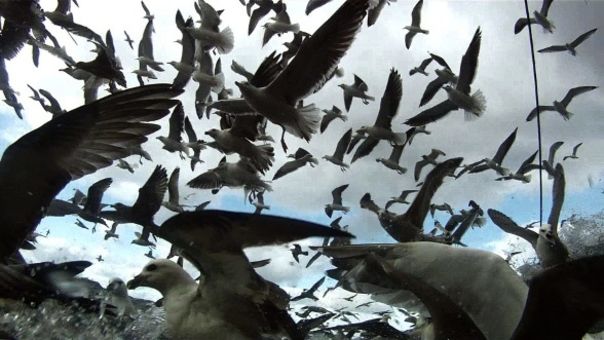The Beginning Of The End
Lucía Salas of the 2013 Talent Press Buenos Aires reviews the LEVIATHAN by Lucien Castaing-Taylor and Véréna Paravel from the Avant-garde and Genre Section.

LEVIATHAN by Lucien Castaing-Taylor and Véréna Paravel
In the Judeo-Christian tradition, the Leviathan is a sea beast. In political philosophy, the Leviathan is associated with man as a wolf to man. LEVIATHAN is a film that suggests that man is a wolf to man and to the beasts, because man and its technology have exceeded any imaginable monstrosity.
LEVIATHAN is a film about the tradition of the genre it represents. There is a tradition in the history of documentary filmmaking regarding the relationship between man and nature, which specifically studies the subject of fishing. Fishing has always been explored by the new realisms, with every new generation of realists depositing its different viewpoints in their approach to what is real. MAN OF ARAN, FISHERMEN'S NETS and STROMBOLI are some examples, which are related to the change of paradigm in the relationship between documentary film and fiction, between what is documented and what is real.
Castaing-Taylor and Paravel's LEVIATHAN is representative of its era. It is neither an unimaginable monster nor a disorganized society. It is a very small camera that can meddle anywhere and register everything. The Leviathan is a technological artifact, it has the ability to register something like it has never been done before; it has the ability to see (and show) everything.
But LEVIATHAN is not a film about the end of the world. This camera can be silenced (a black frame) and its ability to make an impression can be passed on to sound registering. Though the effect may be equally exasperating and sensational, it is also more suspicious, since sound is easier to recreate. What we see is clearly a clipping of what is real in this voyage in boat, but what we hear is impossible to corroborate. That is why this is not a film about the end of the world but about what the end of the world could look like if we were unaware or irresponsible of the technological possibilities of our time.
LEVIATHAN, under that halo of observational documentary film, subtly enquires about the ideological effects of the artifact. It enquires about how it is possible to continue certain traditions in an era where everything can be registered, and about what should be documented in this era of new facilitators. It also enquires about the role of the filmmaker as the operator of these artifacts. New machines, which operate on their own, rather than take away responsibilities, increase them. Man, behind and in front of the camera, has to take full responsibility over what the artifact registers. Without direct intervention on the registration of images, the critical approach on the production can be greater, the same with the study of these images. The responsibility with the exhibition of these images is greater.
LEVIATHAN as a film which is very conscious of all this; indeed, it is documentary about fishermen and fish, about old sea beasts captured by the new Leviathan, the GoPro cameras.

